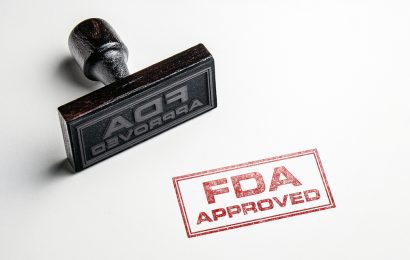The U.S. Food and Drug Administration (FDA) has approved the combination oral diabetes medicine Synjardy XR for use, along with a healthful diet and exercise, in adults with Type 2 diabetes. Synjardy XR, a joint development of Boehringer Ingelheim Pharmaceuticals and Eli Lilly and Company, combines empagliflozin (brand name Jardiance), an SGLT2 inhibitor, and metformin extended-release (brand name Glucophage XR and others).
In the process of filtering the blood, the kidneys typically reabsorb all the filtered glucose and return it to the bloodstream. One of the main proteins responsible for this reabsorption is SGLT2. By inhibiting the action of SGLT2, empagliflozin blocks the reabsorption of glucose by the kidneys, promoting a loss of glucose in the urine and lowering blood glucose levels. Metformin works by decreasing the amount of glucose made by the liver and by improving insulin sensitivity in the liver, muscle, and fat cells.
Synjardy XR tablets will be offered in doses of 5 milligrams of empagliflozin/1,000 milligrams of metformin extended-release, 10 milligrams of empagliflozin/1,000 milligrams of metformin extended-release, 12.5 milligrams of empagliflozin/1,000 milligrams of metformin extended-release, and 25 milligrams of empagliflozin/1,000 milligrams of metformin extended-release, to be taken once daily with the morning meal.
The approval of Synjardy was based on results from multiple studies of empagliflozin and metformin alone or combined with a sulfonylurea in adults with Type 2 diabetes.
This medicine should not be used in people with Type 1 diabetes, diabetic ketoacidosis (a potentially life-threatening condition marked by a chemical imbalance in the body), or moderate to severe kidney problems. As with all medicines containing metformin, this drug contains a boxed label warning on the risk for a rare but serious complication known as lactic acidosis (a buildup of lactic acid in the bloodstream).
Possible side effects of Synjardy XR include dehydration, ketoacidosis, kidney problems, serious urinary tract infections, hypoglycemia (low blood sugar), genital yeast infection, vitamin B12 deficiency, or increased blood cholesterol. Other common side effects include diarrhea, nausea, vomiting, gas, stomach pain, indigestion, weakness, and headache.
For more information about Synjardy XR, see the press release on the Boehringer Ingelheim website.
Looking for the motivation to exercise in the new year, the truth behind 12 of the most popular diabetes myths, a Date Night Dinner Menu for Valentine’s Day, and more? Bookmark DiabetesSelfManagement.com and tune in tomorrow to learn more.





